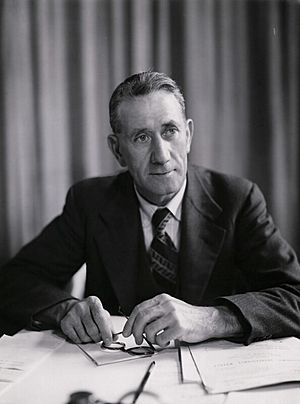Alfred Barnes (Labour politician) facts for kids
Quick facts for kids
Alfred Barnes
|
|
|---|---|
 |
|
| Minister of Transport | |
| In office 3 August 1945 – 26 October 1951 |
|
| Prime Minister | Clement Attlee |
| Preceded by | The Lord Leathers |
| Succeeded by | John Maclay |
| Chair of the Co-operative Party | |
| In office 1924–1945 |
|
| Preceded by | William Henry Watkins |
| Succeeded by | William Coldrick |
| Member of Parliament for East Ham South |
|
| In office 14 November 1935 – 26 May 1955 |
|
| Preceded by | Malcolm Campbell-Johnston |
| Succeeded by | Albert Oram |
| In office 15 November 1922 – 27 October 1931 |
|
| Preceded by | Clement Edwards |
| Succeeded by | Malcolm Campbell-Johnston |
| Personal details | |
| Born | 17 July 1887 Plaistow, Newham, England |
| Died | 26 November 1974 (aged 87) Walton-on-the-Naze, Essex, England |
| Political party | Labour and Co-operative |
| Alma mater | Northampton Institute Central School of Arts and Crafts |
Alfred John Barnes (born July 17, 1887 – died November 26, 1974) was an important British politician. He was a member of the Labour and Co-operative parties. He served as a Member of Parliament (MP) for many years. He also held a big job as the Minister of Transport.
Contents
Who Was Alfred Barnes?
Alfred Barnes was born in North Woolwich, England. He was the youngest child of William Barnes, who worked as a docker. His brother, Billy, became a professional football player. When Alfred was 8 years old, he had an accident at a fairground and lost one of his legs. He went to school at the Northampton Institute and the Central School of Arts and Crafts.
Early Life and Work
Alfred Barnes first worked as an artist. He created beautiful items using gold and silver. He joined the Independent Labour Party when it was quite new. He also became very involved in the co-operative movement. This movement helps people work together to own and run businesses.
Barnes was the chairman of the London Co-operative Society for nine years. This was until 1923. He also helped start the Co-operative Party. He became the chairman of this party in 1924 and stayed in that role until 1945. He was also a director and president of the National Cooperative Publishing Society.
Becoming a Member of Parliament
In November 1922, Alfred Barnes was elected as a Member of Parliament (MP). He represented the area of East Ham South. In 1925, he was given a special role as a Labour Whip. This meant he helped make sure other Labour MPs voted in line with the party. He also served as a Junior Lord of the Treasury in the government.
However, he had to leave his whip job in October 1930. This was because of a rule that said a minister could not be a director of a public company. Even though his job at the National Cooperative Publishing Society was unpaid, it was still a public company. Barnes decided to stay on the co-op board instead of being a whip. Like many Labour MPs, he lost his seat in the 1931 general election. But he won it back in 1935.
Minister of Transport
In 1945, Alfred Barnes became a Privy Counsellor. This is an important advisory group to the King or Queen. He was also made the Minister of War Transport. Later, this job was renamed Minister of Transport. He was in charge of transport in the country. He held this important position until the Labour government left power in 1951. He stopped being a Member of Parliament in the 1955 general election.
 | Ernest Everett Just |
 | Mary Jackson |
 | Emmett Chappelle |
 | Marie Maynard Daly |

